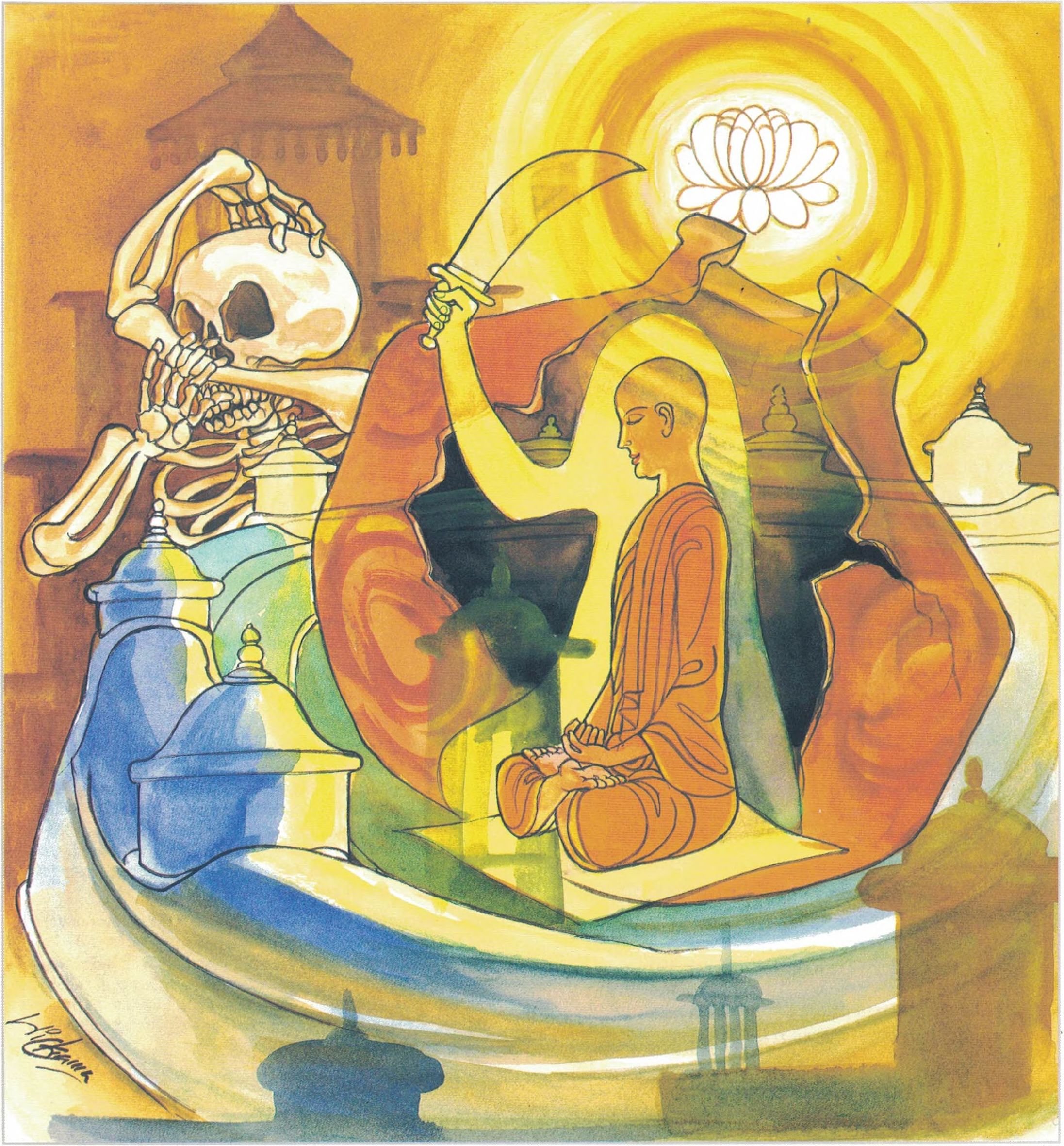Dhammapada (Illustrated)
by Ven. Weagoda Sarada Maha Thero | 1993 | 341,201 words | ISBN-10: 9810049382 | ISBN-13: 9789810049386
This page describes The Story of Five Hundred Monks which is verse 40 of the English translation of the Dhammapada which forms a part of the Sutta Pitaka of the Buddhist canon of literature. Presenting the fundamental basics of the Buddhist way of life, the Dhammapada is a collection of 423 stanzas. This verse 40 is part of the Citta Vagga (Mind) and the moral of the story is “Win over the forces of evil with wisdom, fortifying your mind as a guarded city”.
Verse 40 - The Story of Five Hundred Monks
Pali text, illustration and English translation of Dhammapada verse 40:
kumbhūpamaṃ kāyamimaṃ viditvā nagarūpamaṃ cittamidaṃ ṭhapetvā |
yodhetha māraṃ paññāyudhena jitañca rakkhe anivesano siyā || 40 ||
40. Having known this urn-like body, made firm this mind as fortress town, with wisdom-weapon one fights Māra while guarding booty, unattached.
 Win over the forces of evil with wisdom, fortifying your mind as a guarded city. |
The Story of Five Hundred Monks
While residing at the Jetavana Monastery, the Buddha spoke this verse, with reference to five hundred monks.
Five hundred monks from Sāvatthi, after obtaining a meditation topic from the Buddha, travelled for a distance of one hundred leagues away from Sāvatthi and came to a large forest grove, a suitable place for meditation practice. The guardian spirits of the trees dwelling in that forest thought that if those monks were staying in the forest, it would not be proper for them to live with their families. So, they descended from the trees, thinking that the monks would stop there only for one night. But the monks were still there at the end of a fortnight; then it occurred to them that the monks might be staying there till the end of the vassa. In that case, they and their families would have to be living on the ground for a long time. So, they decided to frighten away the monks, by making ghostly sounds and frightful apparitions. They showed up with bodies without heads, and with heads without bodies. The monks were very upset and left the place and returned to the Buddha, to whom they related everything. On hearing their account, the Buddha told them that this had happened because previously they went without any protection and that they should go back there armed with suitable protection.
So saying, the Buddha taught them the protective discourse Metta Sutta at length (Loving-Kindness) beginning with the following stanza:
karanīyamattha kusalena—yaṃ taṃ santaṃ padaṃ abhisamecca
sakko ujū ca sūjū ca—suvaco c'assa mudu anatimāni.“He who is skilled in (acquiring) what is good and beneficial, (mundane as well as supramundane), aspiring to attain perfect peace (Nibbāna) should act (thus): He should be efficient, upright, perfectly upright, compliant, gentle and free from conceit.”
The monks were instructed to recite the sutta from the time they came to the outskirts of the forest grove and to enter the monastery reciting it. The monks returned to the forest grove and did as they were told. The guardian spirits of the trees receiving loving-kindness from the monks reciprocated by welcoming them and not harming them. There were no more ghostly sounds and frightening sights. Thus left in peace, the monks meditated on the body and came to realize its fragile and impermanent nature. From the Jetavana monastery, the Buddha, by his supernormal power, learned about the progress of the monks and sent forth his radiance making them feel his presence. To them he said, “Monks just as you have realized, the body is, indeed, impermanent and fragile like an earthen jar.”
Explanatory Translation (Verse 40)
imaṃ kāyaṃ kumbhūpamaṃ viditvā, idaṃ cittaṃ
nagarūpamaṃ ṭhapetvā paññāyudhena māraṃ
yodhetha jitaṃ ca rakkhe anivesano siyā
imaṃ kāyaṃ [kāya]: this body; kumbhūpamaṃ viditvā: viewing as a clay pot; idaṃ cittaṃ [citta]: this mind; nagarūpamaṃ [nagarūpama]: as a protected city; ṭhapetvā: considering; paññāyudhena: with the weapon of wisdom; Māraṃ [Māra]: forces of evil; yodhetha: attack; jitaṃ [jita]: what has been conquered; rakkhe: protect too; anivesano [anivesana]: no seeker of an abode; siyā: be
It is realistic to think of the body as vulnerable, fragile, frail and easily disintegrated. In fact, one must consider it a clay vessel. The mind should be thought of as a city. One has to be perpetually mindful to protect the city. Forces of evil have to be fought with the weapon of wisdom. After the battle, once you have achieved victory, live without being attached to the mortal self.
Commentary and exegetical material (Verse 40)
kumbhūpamaṃ: compared to an earthen pot. The monks are asked to think of the human body as an earthen pot–fragile, very vulnerable.
cittaṃ nagarūpamaṃ: think of the mind as a guarded citadel. The special quality of the citadel is within it all valuable treasures are stored and guarded. Any outsider can enter and plunder if this is unguarded. It, too, could be attacked by blemishes.
yodhetha Māraṃ paññāyudhena: oppose Māra (evil) with the weapon of wisdom. When forces of evil attack the mind–the city to be guarded–the only weapon for a counter offensive is wisdom, which is a perfect awareness of the nature of things in the real sense.
